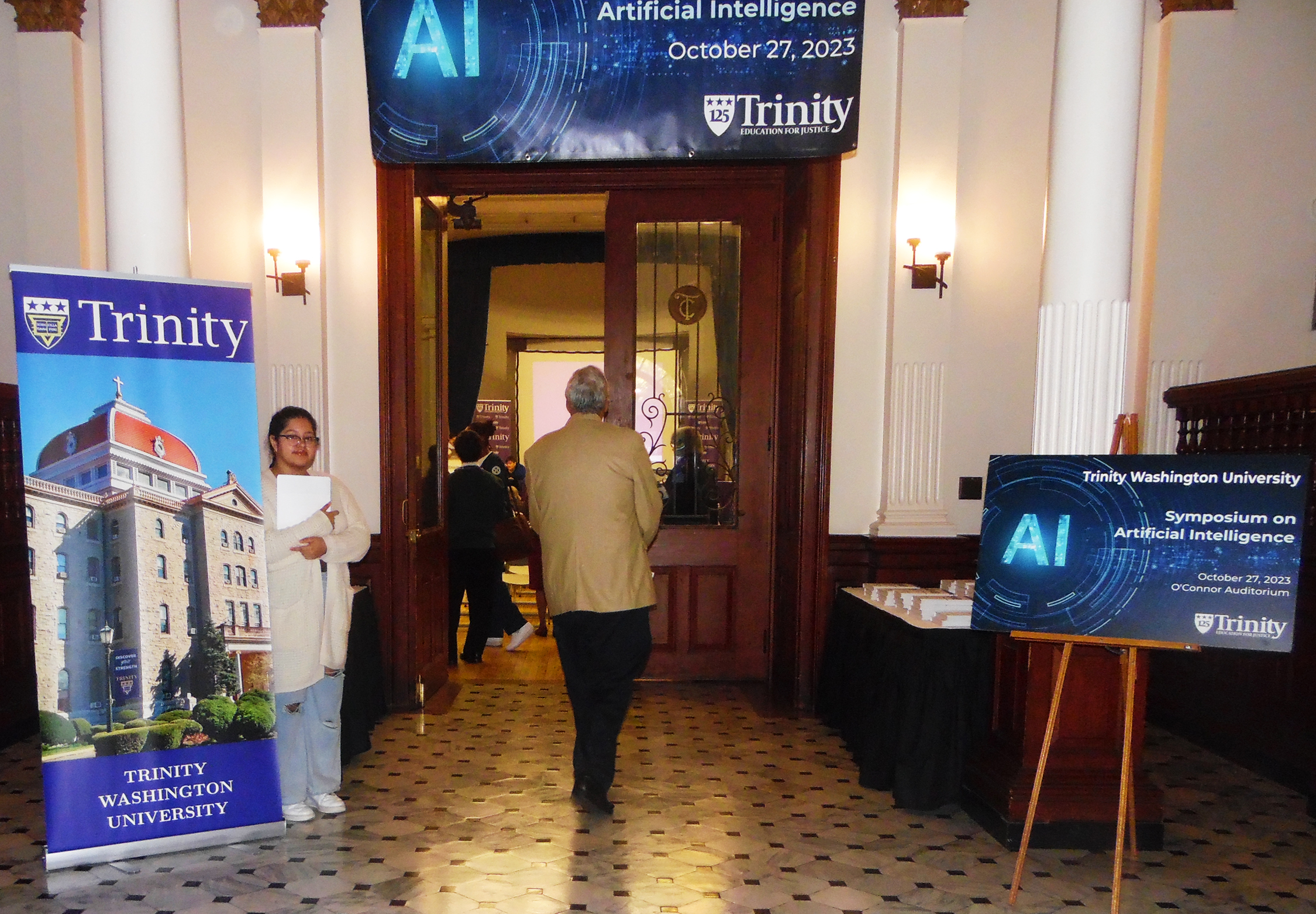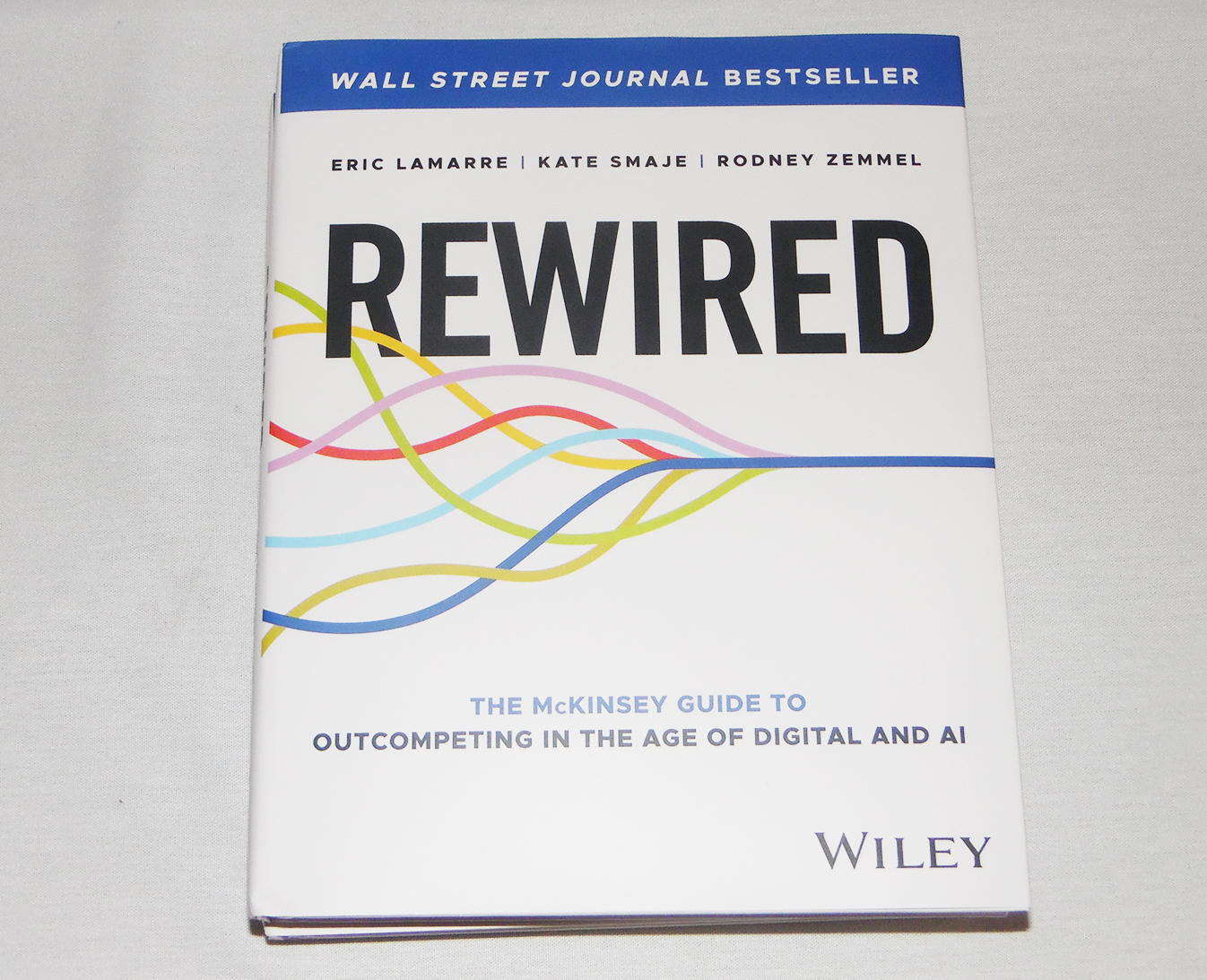
By Kayla Higgs
Trinity Times Correspondent
Artificial intelligence is being called “the fourth industrial revolution” and the administration and faculty at Trinity Washington University are eager to have a seat at the table as the emerging technology materializes in most facets of society.
That “fourth industrial revolution” reference was a direct quote from Prem Misir, a Trinity adjunct professor of Public Health, during the university’s first ever tech-based symposium Oct. 27, 2023, featuring AI as the overarching topic, with most in the crowd leaving with a better understanding of what it is and a little less anxiety about its implications on their world.
“Why should Trinity of all places talk about AI?” Trinity President Patricia McGuire asked the crowd of alumni, current students, staff and faculty gathered in Main Hall’s O’Connor Auditorium, before giving examples of how artificial intelligence has already impacted multiple spaces, from “silly” AI generated photos of Pope Francis in Balenciaga to ChatGPT to the recent strikes from writers and actors’ unions.
The “bottom line,” McGuire said, is that “our students will be the future” and Trinity should prepare them for workplaces in the present and future, ” meaning AI should be included.”
“AI is dazzling,” said Bryce Hall, an associate partner of McKinsey & Co. who was the keynote speaker at Trinity’s Symposium on Artificial Intelligence. “It’s an exciting time to be involved in this field.”
Hall’s colleagues at McKinsey – Eric Lamarre, Kate Smaje, and Rodney Zemmel – wrote the best-selling book “Rewired: The McKinsey Guide to Outcompeting in the Age of Digital and AI,” which provides a roadmap for adopting new functioning models, assembling a talent bench and creating a workforce environment that allows teams to innovate with AI.

Generative AI (GenAI) – defined by McKinsey & Co. as “algorithms (such as ChatGPT) that can be used to create new content, including audio, code, images, text, simulations, and videos” – is the type of technology that has been widely debated during the past year, with Hall stating emphatically that “2023 was the breakout year” for GenAI.
However, 2023 isn’t the year AI was created.
During the symposium panel discussion “AI Revolution in Medicine and Patient Care,” Dr. Mark Smith, a Georgetown University professor of Emergency Medicine, told the audience it was at the Dartmouth Conference in 1956 the term “Artificial Intelligence” was coined by John McCarthy, the renown American computer and cognitive scientist.
“AI is what a computer does,” Smith said, “that is labeled as intelligent when people do it.”
One of the biggest questions swirling throughout the symposium audience concerned the role humans will play in the AI revolution. “Think about AI as the co-pilot,” said Brian K. Smith, a professor and associate dean at Boston College’s Lynch School of Education, while listing examples to assure the audience that AI is not as scary as it seems.
To illustrate that point, Children’s National Hospital Chief Medical Information Officer Dr. Jessica Herstek asserted that all AI must be created by a human, later calling ChatGPT a “fancier Google.”
Boston College’s Smith stressed that instead of fearing AI, higher education officials should focus on how to improve AI, especially when it comes to racial and gender bias, as well as maintaining educational integrity.
Like Trinity, Boston College is a Catholic institution of higher education, prompting McGuire to ask Smith about the role of Catholic universities and colleges regarding AI
Smith spoke about members of a group from Catholic institutions who came together to talk about AI usage in schools.
“If the first concern was cheating, you have to think about why people are cheating in the first place,” he said, while musing about ChatGPT worries that arose in the education space.
Smith and McGuire both stressed the need for Catholic schools to have a seat at the table in establishing a path forward with AI advances, ethics and implementation.
McGuire also used this opportunity to announce Trinity is in the process of creating a data analytics major program.
Pressing issues people in higher education are having with AI include plagiarism, devaluing analytic and communication skills, information ownership and copyright, human bias, and students “competing” with AI and inaccuracy, said Jennifer Steele, a professor in American University’s School of Education.
“Give me a word that means innovative that starts with A?” Steele asked ChatGPT during the symposium, to which she received back three words that were synonymous with innovative but did not start with the letter A.
“You need to be the metacognitive adult” if you are going to use GenAI to help with coursework, she told students in the audience.
However, Steele did illustrate some of the helpful functions AI could provide students in understanding dense readings.
Trinity students have said that AI can help them navigate some of their coursework. “Students have said ChatGPT is good for brainstorming,” Trinity senior Karla Nuñez Pérez told Trinity Times.
“It is predicted that 86% of changes in the work force will be because of AI,” said Dr. Cynthia Greer, associate professor of Counseling at Trinity, with lower paying jobs in the fast-food industry or retail being directly affected. Which is why, in Greer’s view, AI development should be “trauma-informed” and have a “responsive lens.”
One of the most enthralling portions of the symposium came during a conversation about how AI is transforming health care, especially among the older members of the audience, who openly wondered if the technology would improve information sharing between hospitals.
Both Dr. Smith and Dr. Hersteck said that AI could improve health data by summarizing health history, but “human error and the lack of health professionals” are still issues that AI might not address.
The symposium concluded with Tekedra Mawakana, a Trinity class of 1993 alum, who is the co-CEO of Waymo Self-Driving Cars.
For decades self-driving cars were viewed as the epitome of “the future” and are now finally available in Phoenix, San Francisco, Los Angeles, and Austin, Texas, and eventually across the U.S.
The audience members visibly showed their eagerness to learn more about the self-driving car technology that was inconceivable just a few decades ago and is now made possible due to AI technology.
“We’re building the world’s most mysterious driver,” Mawakana said, before showing a slickly produced advertisement for the Waymo car.
One of the best features, she told the audience, is the self-driving vehicle will make the roads safer due to its “sensor suite” trained to detect all the daily road conditions and programed by “comprehensive maps.”
The concept is similar to ordering an Uber or Lyft, with riders arranging for a pickup from a Waymo self-driving car. The price of a Waymo ride is also similar to its human driver ride-share competitors.
Mawakana used her platform to share career advice with her Trinity sisters and lit up when telling them learning has been her main motivator. She also advises Trinity students to fight for opportunities “even if they don’t want them” because it is also about them women who will come behind them who do want the opportunity.
Trinity students – such as Ronnique Jones, who is also an enrollment specialist at the university – said they were pleased students were included on the symposium panels and that the program focused on what students wanted to know about AI.Students also said they are excited to know that moving forward Trinity promises to include tech into the university’s culture.